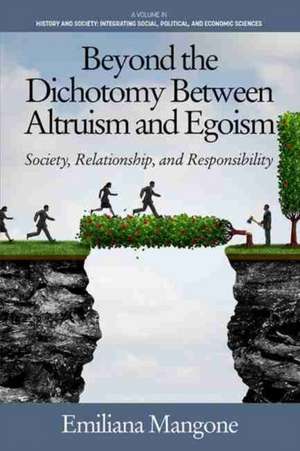Beyond the Dichotomy Between Altruism and Egoism
Autor Emiliana Mangoneen Limba Engleză Paperback – 21 mai 2020
| Toate formatele și edițiile | Preț | Express |
|---|---|---|
| Paperback (1) | 388.03 lei 6-8 săpt. | |
| Information Age Publishing – 21 mai 2020 | 388.03 lei 6-8 săpt. | |
| Hardback (1) | 584.98 lei 6-8 săpt. | |
| Information Age Publishing – 21 mai 2020 | 584.98 lei 6-8 săpt. |
Preț: 388.03 lei
Nou
Puncte Express: 582
Preț estimativ în valută:
74.25€ • 77.88$ • 61.81£
74.25€ • 77.88$ • 61.81£
Carte tipărită la comandă
Livrare economică 01-15 aprilie
Preluare comenzi: 021 569.72.76
Specificații
ISBN-13: 9781648021282
ISBN-10: 164802128X
Pagini: 220
Dimensiuni: 156 x 234 x 12 mm
Greutate: 0.31 kg
Editura: Information Age Publishing
ISBN-10: 164802128X
Pagini: 220
Dimensiuni: 156 x 234 x 12 mm
Greutate: 0.31 kg
Editura: Information Age Publishing
Notă biografică
Emiliana Mangone is an Associate Professor of Sociology of Culture and Communication at the Department of Political and Communication Sciences, University of Salerno, Italy. She is the Director of the Narratives and Social Changes-International Research Group (2020-2026), and she was the Director of the International Centre for Studies and Research on "Mediterranean Knowledge" (2015-2020). Her main investigative interests are in the field of cultural and institutional systems, with particular attention to the social representations, relational processes, and knowledge as key elements to human action, migration studies, and as well as the study of the thought of Pitirim A. Sorokin. She recently published: 'Narratives and Social Change. Social Reality in Contemporary Society' (Springer, 2022); 'Beyond the Dichotomy Between Altruism and Egoism. Society, Relationship, and Responsibility' (Information Age Publishing, 2020); and 'Social and Cultural Dynamics. Revisiting the Work of Pitirim A. Sorokin' (Springer, 2018). For further information, see her personal page: https://emilianamangone.com/
Descriere
Analyses the concept of altruism, starting from classical philosophy up to the systems of ideas of contemporaneity. The goal is to highlight how positive actions are necessary for contemporary society and how social sciences must go back and study positive socio-cultural actions and phenomena to promote them for the well-being of the society.
